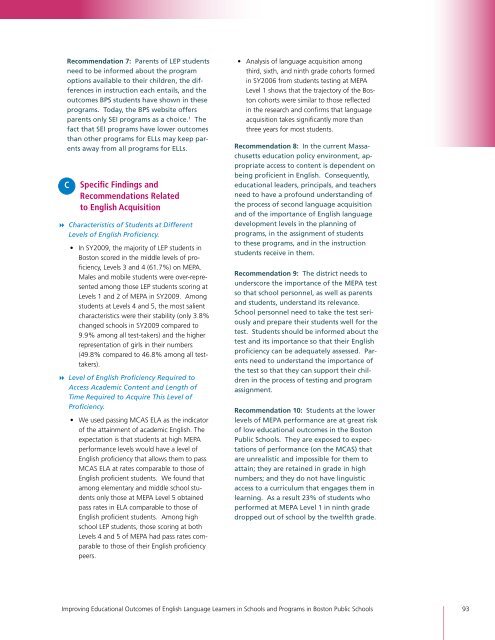Full Report - Center for Collaborative Education
Full Report - Center for Collaborative Education
Full Report - Center for Collaborative Education
You also want an ePaper? Increase the reach of your titles
YUMPU automatically turns print PDFs into web optimized ePapers that Google loves.
Recommendation 7: Parents of LEP students<br />
need to be in<strong>for</strong>med about the program<br />
options available to their children, the differences<br />
in instruction each entails, and the<br />
outcomes BPS students have shown in these<br />
programs. Today, the BPS website offers<br />
parents only SEI programs as a choice. 1 The<br />
fact that SEI programs have lower outcomes<br />
than other programs <strong>for</strong> ELLs may keep parents<br />
away from all programs <strong>for</strong> ELLs.<br />
C Specific Findings and<br />
Recommendations Related<br />
to English Acquisition<br />
8 Characteristics of Students at Different<br />
Levels of English Proficiency.<br />
• In SY2009, the majority of LEP students in<br />
Boston scored in the middle levels of proficiency,<br />
Levels 3 and 4 (61.7%) on MEPA.<br />
Males and mobile students were over-represented<br />
among those LEP students scoring at<br />
Levels 1 and 2 of MEPA in SY2009. Among<br />
students at Levels 4 and 5, the most salient<br />
characteristics were their stability (only 3.8%<br />
changed schools in SY2009 compared to<br />
9.9% among all test-takers) and the higher<br />
representation of girls in their numbers<br />
(49.8% compared to 46.8% among all testtakers).<br />
8 Level of English Proficiency Required to<br />
Access Academic Content and Length of<br />
Time Required to Acquire This Level of<br />
Proficiency.<br />
• We used passing MCAS ELA as the indicator<br />
of the attainment of academic English. The<br />
expectation is that students at high MEPA<br />
per<strong>for</strong>mance levels would have a level of<br />
English proficiency that allows them to pass<br />
MCAS ELA at rates comparable to those of<br />
English proficient students. We found that<br />
among elementary and middle school students<br />
only those at MEPA Level 5 obtained<br />
pass rates in ELA comparable to those of<br />
English proficient students. Among high<br />
school LEP students, those scoring at both<br />
Levels 4 and 5 of MEPA had pass rates comparable<br />
to those of their English proficiency<br />
peers.<br />
• Analysis of language acquisition among<br />
third, sixth, and ninth grade cohorts <strong>for</strong>med<br />
in SY2006 from students testing at MEPA<br />
Level 1 shows that the trajectory of the Boston<br />
cohorts were similar to those reflected<br />
in the research and confirms that language<br />
acquisition takes significantly more than<br />
three years <strong>for</strong> most students.<br />
Recommendation 8: In the current Massachusetts<br />
education policy environment, appropriate<br />
access to content is dependent on<br />
being proficient in English. Consequently,<br />
educational leaders, principals, and teachers<br />
need to have a profound understanding of<br />
the process of second language acquisition<br />
and of the importance of English language<br />
development levels in the planning of<br />
programs, in the assignment of students<br />
to these programs, and in the instruction<br />
students receive in them.<br />
Recommendation 9: The district needs to<br />
underscore the importance of the MEPA test<br />
so that school personnel, as well as parents<br />
and students, understand its relevance.<br />
School personnel need to take the test seriously<br />
and prepare their students well <strong>for</strong> the<br />
test. Students should be in<strong>for</strong>med about the<br />
test and its importance so that their English<br />
proficiency can be adequately assessed. Parents<br />
need to understand the importance of<br />
the test so that they can support their children<br />
in the process of testing and program<br />
assignment.<br />
Recommendation 10: Students at the lower<br />
levels of MEPA per<strong>for</strong>mance are at great risk<br />
of low educational outcomes in the Boston<br />
Public Schools. They are exposed to expectations<br />
of per<strong>for</strong>mance (on the MCAS) that<br />
are unrealistic and impossible <strong>for</strong> them to<br />
attain; they are retained in grade in high<br />
numbers; and they do not have linguistic<br />
access to a curriculum that engages them in<br />
learning. As a result 23% of students who<br />
per<strong>for</strong>med at MEPA Level 1 in ninth grade<br />
dropped out of school by the twelfth grade.<br />
Improving <strong>Education</strong>al Outcomes of English Language Learners in Schools and Programs in Boston Public Schools 93


